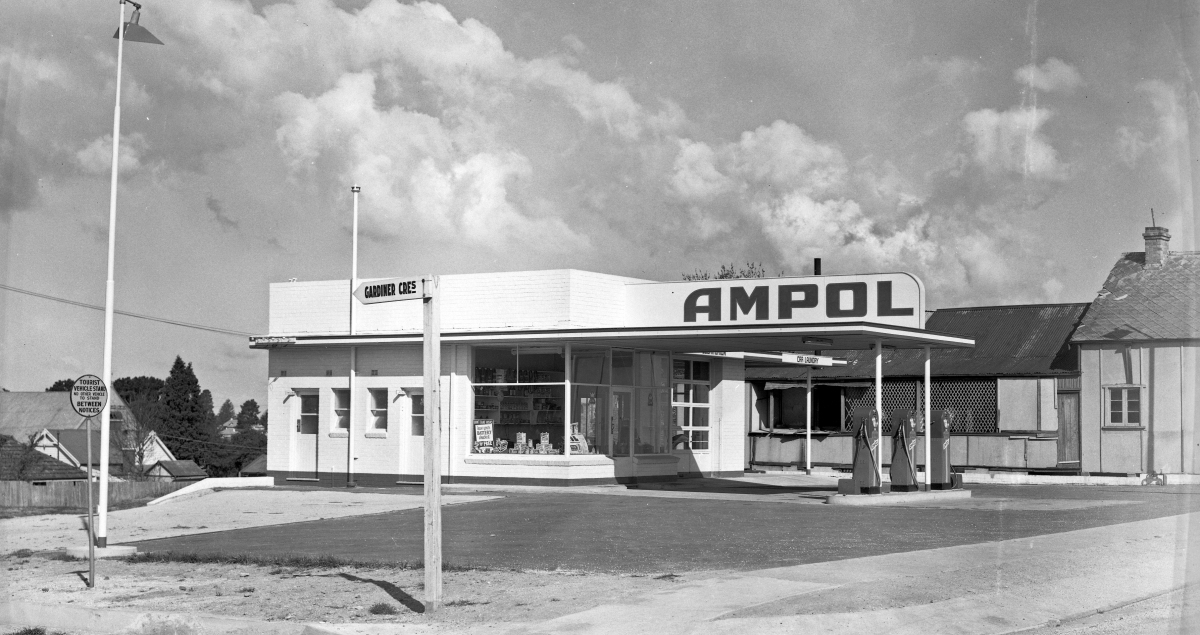The Walkleys walkout
In case you didn’t know, Australia’s premier media industry awards were established by a guy who has a name that sounds like an old-timey fossil fuel baron from the 1950s. That’s because Sir William Gaston Walkley was an old-timey fossil fuel baron from the 1950s.
Belinda Noble from Comms Declare, a climate advertising and media advocacy group, comfortably has the lead in Australia in exposing how the ‘Walkley awards’ stem from the somewhat gross desire of a fossil fuel guy to develop PR techniques to influence and control media narratives (she also reveals in that piece that Gaston Walkley was a racist piece of shit, which is a nice extra).
Fast forward to now: Bill’s company, Ampol, is the major sponsor of the Walkley awards. Ampol: who don’t count scope 3 emissions in their climate target (that’s 82% of their emissions, by their own data), pay influencers to promote fossil fuels, and sell dodgy “carbon neutral” fossil fuels (currently subject to a complaint led by Comms Declare, and a claim made specifically using a very, very dodgy type of carbon offset).
This isn’t new for the Walkleys – journalist Lyndal Rowlands wrote about the ‘Regional Journalism Summit’, which she initially discovered did not mention climate change in its program. “When I looked a little further I also saw that the summit was sponsored by AGL as well as APA – a gas pipeline company” (Lyndal has been raising her concerns about the Walkleys for some time now). In the summer directly after the extremely severe black summer bushfires, the Walkleys hosted their awards at Sky News Australia, a rabid right-wing disinformation aggregator that denies climate science and spreads fabricated content around climate solutions.
In response, yesterday, a flurry of award-winning cartoonists and writers have pulled entries, including
- Jon Kudelka (who set the stone rolling, not entering))
- Cartoonist Matt Golding (not entering)
- Cartoonist David Rowe (not entering)
- Cartoonist First Dog on the Moon (not entering)
- The Monthly writer Nick Feik (not entering)
- Rachel Withers from The Monthly (not entering)
- Writer David Milner (not entering)
- Freelance writer Patrick Lenton (not entering)
- Former Walkleys judge and Conversation cartoon Wes Mountain (not entering)
- Saturday Paper journalist Andy Hazel (not entering)
- Cartoonist Christopher Downes (not entering)
- Cartoonist Megan Herbert (withdrawing – and who got a response from the Walkleys saying they’re ‘reviewing’ sponsorships but won’t be changing this year’s Ampol sponsorship)
- Cartoonist Glen Le Lievre (withdrawing)
- Cartoonist David Blumenstein (withdrawing)
- Producer and journalist Olivia Rousset (withdrawing)
- Science writer Jack Ryan (withdrawing)
- Guardian writer Greg Jericho (withdrawing)
- Cartoonist Fiona Katauskas (withdrawing)
- Cartoonist Andrew Weldon (withdrawing)
- Freelance journalist Andrew Stafford (withdrawing piece about impact of fire on biodiversity)
- Spotify podcast producer Joel Werner pulled out of judging.
- Cartoonists Cathy Wilcox and David Pope calling on the Walkleys to drop fossil fuel sponsorship
On the same day these folks withdrew or announced they won’t submit, the Walkleys happily tweeted an advertisement for a scholarship funded by Ampol, without skipping a single beat:
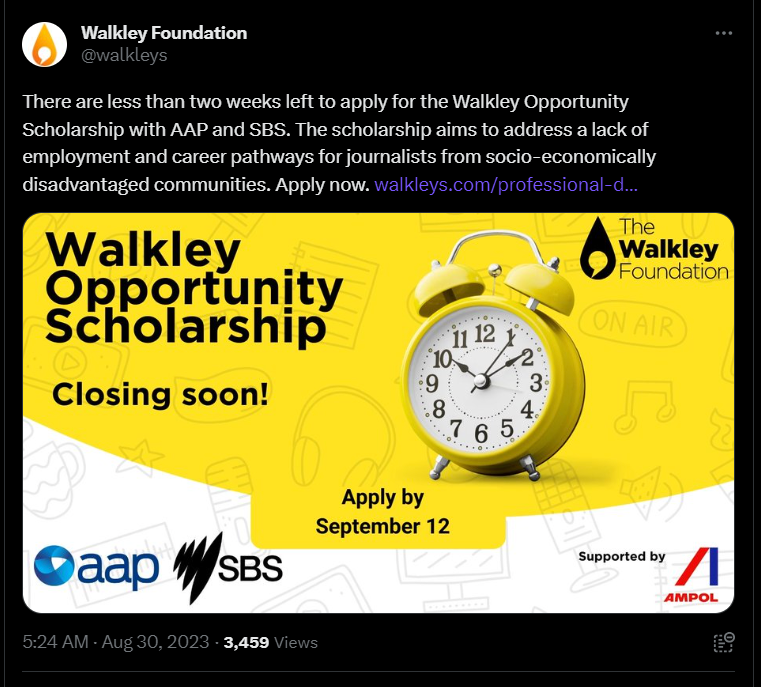
Somewhat spectacularly, it turns out that Ampol actually had a stretch of time when they weren’t a sponsor of the Walkley awards. They RETURNED in 2022, and were accepted by the foundation with open arms. The Walkleys have an explicit policy not to accept sponsorship from any company that would affect their “standing and reputation in the community”, or jeopardise the “moral integrity” of The Walkley Foundation, so it’s a pretty explicit statement about where they stand on fossil fuels and the climate crisis.
Even more spectacularly, the 2022 “yearbook” from the Walkleys shows an award-winning photo of flood-hit Lismore directly above a big, proud flashy logo for Ampol:
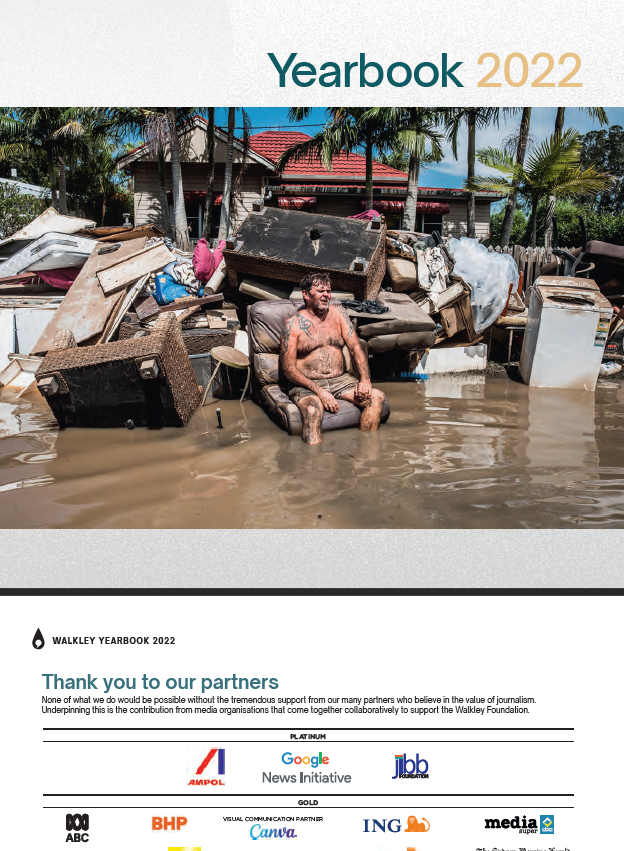
Fossil fuel companies in Australia are absolutely nuts about sponsorships. They essentially have infinite money now (thanks to their profits from a bloody war in Ukraine), so it’s a huge benefit to see their logo splashed across surf clubs, sports clubs, art exhibitions and community organisations. As Rachel Withers at The Monthly points out, Woodside and Shell sponsored the press gallery’s ‘midwinter ball’ up until this year, where the organising committee had to essentially be bullied into dropping them as sponsors. Even then, the organisers just dumped all corporate sponsorship, instead of excising the fossil fuel companies.
This raises an important question: does their sponsorship of the Walkleys do something beyond causing a moral stain on the foundation? Does it actually change how they operate?
The Walkley awards have repeatedly refused to create a new category to celebrate climate reporting, in Australia, as covered in Belinda’s piece above. But I was curious: have they awarded or recognised climate reporting before? And If so, how much?
No, they haven’t, obviously
It isn’t that there’s a lack of climate reporting. The MeCCo database only covers a few print media outlets, and showcases many thousands of articles on climate over the past few decades (115,508 between 2004 and 2023, to be exact):
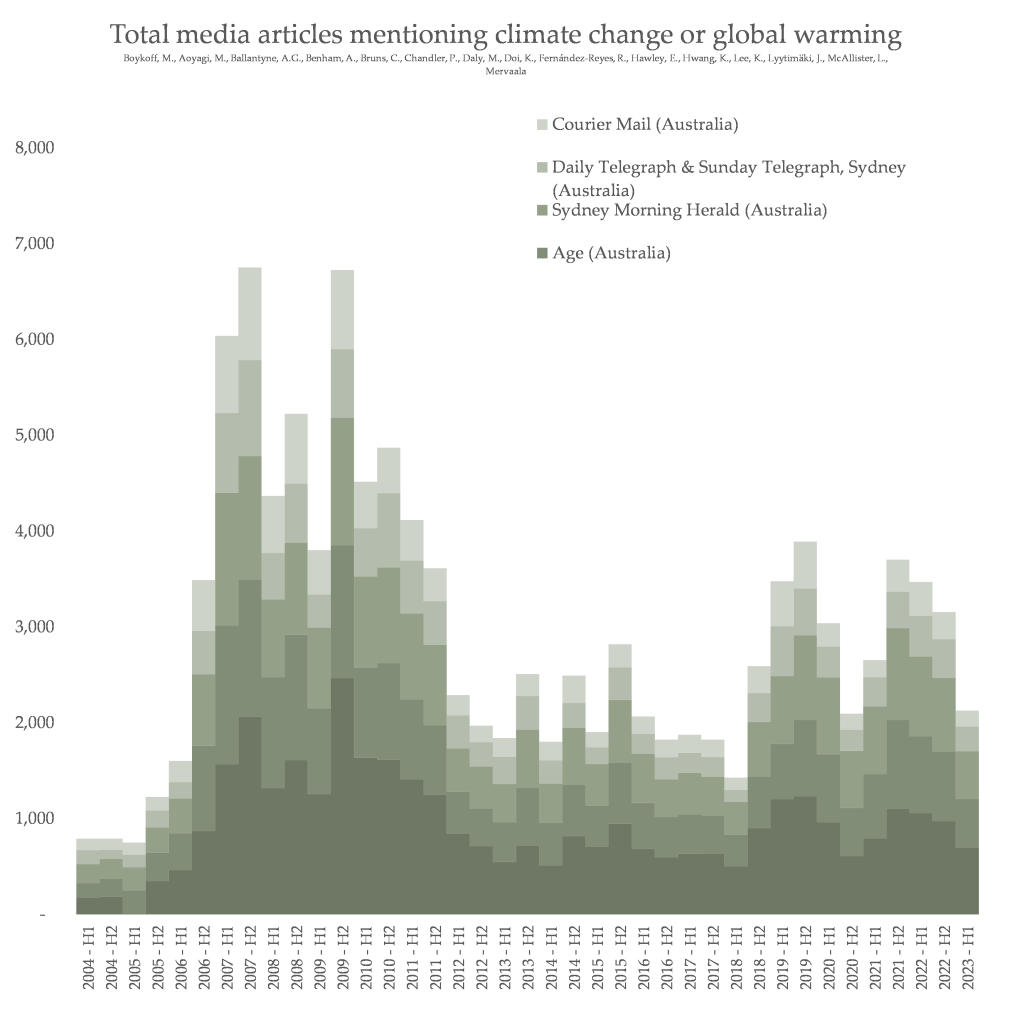
Well: the Walkleys website also has a database. Of all the awards they’ve given, and the titles of those reports. And from what I can tell – using a somewhat clumsy method of keyword searching – the only award granted to a dedicated climate story was handed out in 2008, to a Four Corners episode about the impact of climate change on sea ice. Fifteen years ago.
There are a range of stories, photographs and book awards granted to coverage of climate-intensified disasters, where it’s unclear whether climate change is central or even mentioned – bushfires and floods, in particular, like the photograph above Ampol’s logo above.
In that theme, one award granted to coverage of a flooding disaster was sponsored by BHP Billiton, a major Australian fossil fuel company that has emitted around 113 megatonnes of CO2-e since 2009.
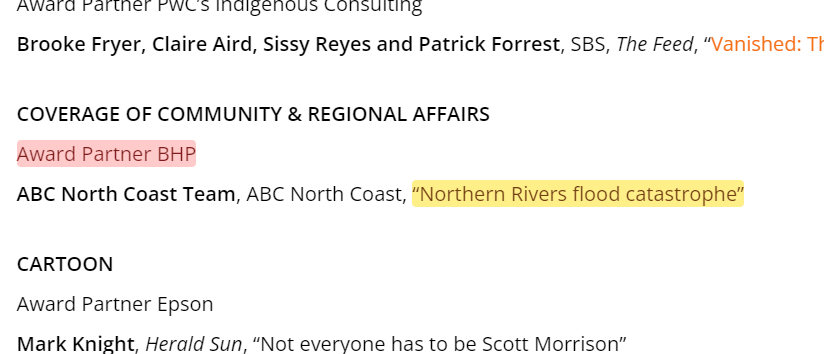
The sole mention of the word ‘climate’ among these titles comes in the form of a 2010 cartoon by Eric Lobbecke, “Rudd’s dangerous climate retreat”, published in News Corp’s delay / denial flagship, The Australian. It depicts former PM Kevin Rudd, who abandoned his visions of an emissions trading scheme policy, enacting a Napoleonesque retreat. It’s not as racist or denialist as The Australian usually is, but it isn’t exactly groundbreaking.
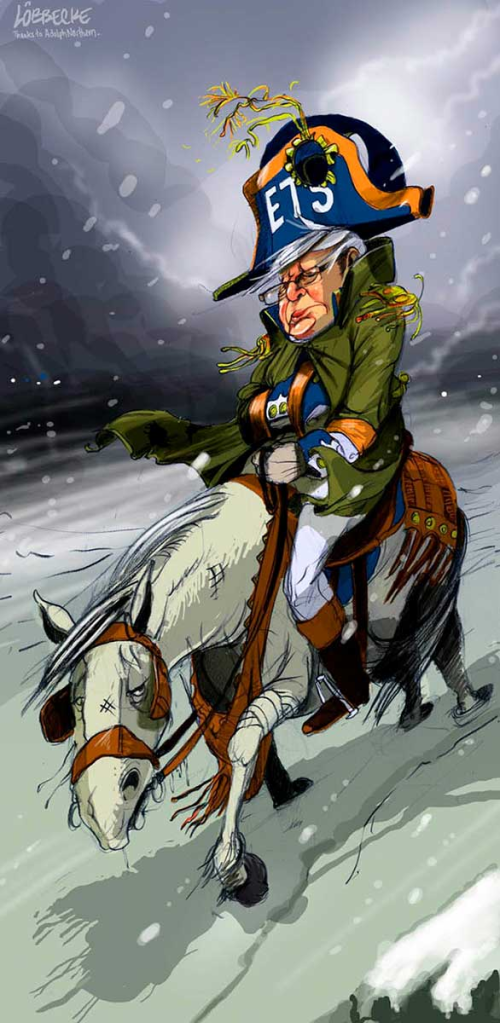
The word ’emission’ gets mentioned once, in a “best headline” award, because the Australian Financial Review wrote a story about a Germany magazine wrongly accusing Tom Cruise of being infertile (“emission impossible”). “Gas” comes up once, in a headline about tear gas. “Oil” is inside the word “boiler”.
That’s around 1,500 awards granted since the mid 1950s, a third of which were granted after the early 1990s when climate science was firmly established. I may have missed a story here or there with a cryptic headline, but I think we can confidently say that this issue has not been even a mild priority, and it’s fairly close to being non-existent in their archive.
Something fundamental needs to change
This is roughly what you’d expect in a culture immune to interrogating the status quo. Fossil fuel companies, in particular, are seen as either morally neutral or, more often, actively good. As I wrote in the Guardian a few years ago, News Corp essentially parroting industry greenwashing lines makes perfect sense.
I don’t think the Walkleys ignore climate stories / refuse to create climate categories on the basis of their origin, or their sponsorship. I think all these things stem from a common ancestor – the idea that fossil fuel companies are essentially blameless, paired with the incompatibility of old-school journalism styles with the contemporary issue of climate.
It took a decade of pressure and campaigning to get climate change explicitly linked to the disasters intensified by climate change, but even that remains patchy – and that reporting will almost never link those stories back to decisions made to worsen fossil fuel reliance. In the photography, documentary and articles covering climate disasters, they are catastrophes without a cause. Hence the cheerful pride with which imagery of climate disaster is placed next to fossil sponsorship logos.
Fossil fuel companies themselves see their PR key messages and lines repeated literally verbatim every single day, across a range of outlets – something pioneered not just by Walkley himself but by the godfathers of modern PR in the US, as covered in Amy Westervelt’s amazing Drilled series, ‘The Mad Men of climate change’.
And those journalists and outlets doing the right thing are swimming against the tide; independent and international outlets like The Monthly, RenewEconomy and the Guardian are a notable minority among the big pack of climate-apathetic or openly-proud-delayers. “Commercial TV news still treats grim climate trajectories as a niche scientific curiosity to be quickly dismissed between car crashes and wayward footy players”, wrote Belinda Noble from Comms Declare.
As we thunder forward into a spike in climate impacts, summer in Australia won’t be quite as mutable or ignorable as the disastrous, deadly summer we’ve had in the northern hemisphere. Australia will go through the real physical pain of a very, very bad summer again. How can a company helping to intensify that pain continue to hold such a protected position?
